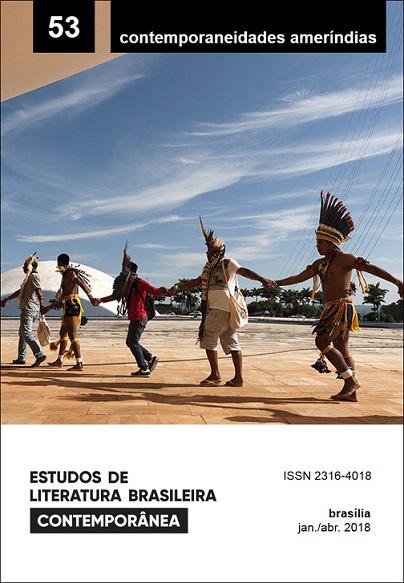Eliane Potiguara e Daniel Munduruku:
por uma cosmovisão ameríndia
DOI:
https://doi.org/10.1590/2316-40185312Abstract
O objetivo deste artigo é analisar como a questão identitária se exprime na literatura indígena contemporânea, em especial em Metade cara metade máscara, de Eliane Potiguara, e Todas as coisas são pequenas, de Daniel Munduruku. Se o livro de Potiguara é um híbrido que mistura discurso mítico, poesia e testemunho pessoal, o de Munduruku se aproxima do modelo do romance barroco tal como analisado por Bakhtin. Através da abordagem desses dois livros, o artigo pretende demonstrar que os autores indígenas estão começando uma nova tradição literária no Brasil.
Downloads
References
ACHUGAR, Hugo (2006). Planetas sem boca. Escritos efêmeros sobre arte, cultura e literatura. Tradução de Lyslei Nascimento. Belo Horizonte: Editora da UFMG.
BAKHTIN, Mikhaïl (2003). Estética da criação verbal. Tradução de Paulo Bezerra. São Paulo: Martins Fontes.
GLISSANT, Edouard (1996). Introdução a uma poética da diversidade. Tradução de Enilce Albergaria Rocha. Juiz de Fora: Editora da UFJF.
GRAÚNA, Graça (2004). Identidade indígena: uma leitura das diferenças. In: POTIGUARA, Eliane. Metade cara metade máscara. São Paulo: Global. (Série Visões Indígenas).
MARIÁTEGUI, José Maria (1975). Sete ensaios de interpretação da realidade peruana. São Paulo: Alfa-Ômega.
MIGNOLO, Walter D. (2008) Desobediência epistêmica: a opção descolonial e o significado de identidade em política. Tradução de Ângela Lopes Norte. Caderno de Letras, Niterói, n. 34, p. 287-324, 1º sem.
MONTAIGNE, Michel de (2000). Des cannibales. Paris: Fayard/Mille-et-une-Nuits.
MUNDURUKU, Daniel (2008). Todas as coisas são pequenas. São Paulo: Arx.
MUNDURUKU, Daniel (2004). Visões de ontem, hoje e amanhã: é hora de ler as palavras. Prefácio. In: POTIGUARA, Eliane. Metade cara, metade máscara. São Paulo: Global.
MUNDURUKU, Daniel (2009). Meu vô Apolinário: um mergulho no rio da (minha) memória. São Paulo: Studio Nobel.
POTIGUARA, Eliane (2004). Metade cara, metade máscara. São Paulo: Global.
RIBEIRO, Darcy (2003). Maíra. Rio de Janeiro: Record, 2003.
ROBIN, Régine (2003). La mémoire saturée. Paris: Stock.
SANTIAGO, Silviano (2004). O cosmopolitismo do pobre. Crítica literária e crítica cultural. Belo Horizonte: Editora da UFMG.
SANTIAGO, Silviano (2011). Destino: globalização. Atalho: nacionalismo. Recurso: cordialidade. In: REIS, Lívia, FIGUEIREDO, Eurídice. América Latina: integração e interlocução. Rio de Janeiro: 7Letras; Santiago (Chile): USACH.
SANTOS, Boaventura de Souza (2010). Para além do pensamento abissal: das linhas globais a uma ecologia dos saberes. In: SANTOS, Boaventura de Souza, MENEZES, Maria Paula (Org.). Epistemologias do Sul. São Paulo: Cortez. p. 31-83.
VELLOSO, Mônica. As tias baianas tomam conta do pedaço: espaço e identidade cultural no Rio de Janeiro. In: SÜSSEKIND, Flora; DIAS, Tânia; AZEVEDO, Carlito (Org.). Vozes femininas: gêneros, mediações e práticas de escrita. Rio de Janeiro: 7Letras; Casa Rui Barbosa. p. 92-117.
Downloads
Published
How to Cite
Issue
Section
License
Authors who publish in this journal agree to the following terms:
a) The authors maintain the copyright and grant the journal the right of first publication, the work being simultaneously licensed under the Creative Commons Attribution License-Non Commercial 4.0 which allows the sharing of the work with acknowledgment of the authorship of the work and publication this journal.
b) Authors are authorized to enter into additional contracts separately, for non-exclusive distribution of the version of the work published in this journal (eg publish in institutional repository or as a book chapter), with authorship recognition and publication in this journal.
c) Authors are allowed and encouraged to publish and distribute their work online (eg in institutional repositories or on their personal page) after the editorial process, as this can generate productive changes, as well as increase the impact and citation of published work (See The Effect of Free Access).
d) The authors of the approved works authorize the magazine to, after publication, transfer its content for reproduction in content crawlers, virtual libraries and the like.
e) The authors assume that the texts submitted to the publication are of their original creation, being fully responsible for their content in the event of possible opposition by third parties.


